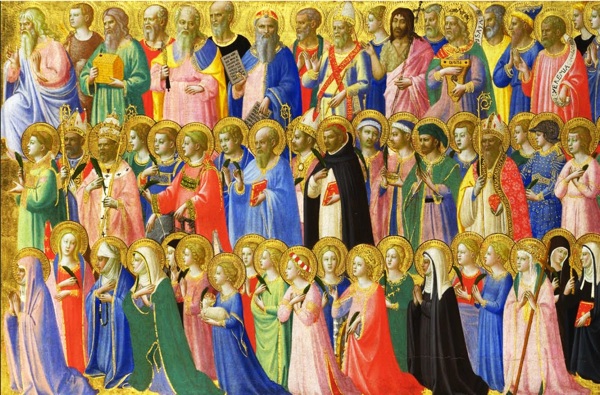Intercessory Prayer and the Communion of Saints

"Why do Catholics pray to the Saints and Mary?" is a common question people have when trying to understand the Catholic faith. The answers given are often misunderstood or miscommunicated.
The answer is simply this, Christians believe in a doctrine known as "The Communion of Saints". For Christians there is no real death of a believer. Jesus Christ assures us that in death the person merely moves from one stage of life to another. From a physical life on earth to a spiritual life with God. The pilgrim Church on earth and the eternal Church in heaven are filled with living Christians. For Catholics there is no total separation between the two states of being; all members of the Church are alive in Christ. This total Church (Pilgrim & Eternal) is called the Communion of Saints.
This is all well and good, but doesn't the Bible condemn speaking to the dead? Doesn't praying to saints violate this commandment of God?
It is true that the book of Deuteronomy (Deut. 18:10–15) uses these words, "...Let there not be found among you anyone who causes their son or daughter to pass through the fire, or practices divination, or is a soothsayer, augur, or sorcerer, or who casts spells, consults ghosts and spirits, or seeks oracles from the dead.", to condemn pagan and occult practices not in line with God's direction. But this is wholly different from the ancient Christian practice of intercessory prayer.
The practice of Intercessory Prayer is constructed from various biblical sources and traditions, but in it's simplist terms it can best be described as a form of prayer derived from the pronouncement of James 5:16-18 which teaches Christians unambiguously to pray for one another, and that, "The fervent prayer of a righteous person is very powerful."
"So who is considered a righteous person?"
In this context, Catholics believe that there are two types of "righteous" persons, Saints with a captial S, and saints with a small s. Throughout the New Testament the Apostles and early christian congregations addressed each other as saints. Every christian who has been Baptized in the Catholic Church and is actively striving to live a holy and pleasing life in accordance with God's Will, is a saint. Their righteousness (See Justification: CCC Par. 1992) is not of their own volition or activity, but is due to the remission of sins through the Passion and Resurrection of Jesus Christ.
The Church takes this a step further when it officially canonizes a saint. This proclamation of Sainthood (capital S) is the Church's official recognition, after intense scrutiny, of a person's life lived with profound virtue and holiness. It is a way for the Church to offer up these persons as shining examples for each of us to emulate on The Way of Christ.
As examples of piety and holiness, each Saint's life, and their trials and responses to trials, offers us hope that our own trials can be overcome in Christ. Some Saints have shown a particular affinity with, and advocacy for certain causes and states of being that mirror our own. These Saints are called "Patron or Patroness Saints". In this way Patron or Patroness Saints are known to offer their intecessory prayers on our behalf in a special way and with special care.
The Equestrian Order of the Holy Sepulchre of Jerusalem looks to these particular Saints as Patrons, Patronesses, and special intercessors:
Our Lady - Queen of Palestine (Annual Liturgical Solemnity, October 25th) - The Blessed Virgin Mary in her role as the Queen-Mother of the Holy Land.
Pope Saint Pius X (Annual Liturgical Memorial, August 21st) - Pontificate 1903-1914 - strong supporter and reformer of the Catholic Orders of Knighthood and defender of the faith from secular modernism.
Saint Helena (Annual Liturgical Memorial, August 18th) - The mother of the Roman Emperor Constantine. She was instrumental in the conversion of Constantine to Christianity and his repair and protection of the christian holy places in Palestine.
The Order also holds in special reverence the liturgical celebration of the Feast of the Exaltation of the Holy Cross which occurs annually on September 14th. This feast day celebrates the finding of the True Cross of Jesus by St. Helena, and is celebrated on the day of the Church of the Holy Sepulchre's dedication in Jerusalem which occured on this day in 335 AD.
